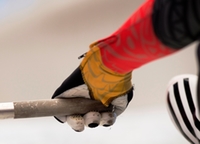Sprint: Flying start, shorter track, start bracket after approximately 100 meters

Innsbruck (RWH) An aerodynamic driving position, excellent sled control, and a perfect racing line are the key criteria for the second Sprint World Championships of the International Luge Federation (FIL) on January 27, 2017 on the Olympic ice track. The race is staged in one day and consists of a qualifying run featuring all registered participants and the final itself in which the fastest 15 qualifiers in the men’s, women’s and doubles events compete for overall victory. Athletes use the traditional flying start, and the clock starts at the 100-meter mark after the start block on the relevant start ramp for women, doubles and men. The point at which the clock starts is indicated by a start bracket.
The distance between start ramp and start bracket is defined as the approach section, and the starting speed is measured from the start bracket using radar equipment. A maximum of one interim time is shown. The finish light barrier is the same as in a normal World Cup race. In contrast to Viessmann World Cups, only the athlete is allowed inside the start area. A maximum of four men, four women and three doubles pairings from each national association are allowed to take part in qualifying.
All in all, this makes the sprint a varied event. In the men’s competition there have been five winners in the nine World Cup sprints since the event made its debut in winter 2014/2015: Felix Loch (GER) has taken five wins to date, with the remaining victories going to Chris Mazdzer (USA), Wolfgang Kindl (AUT), Roman Repilov (RUS), and Dominik Fischnaller (ITA).
There have been five previous winners in the women’s competition: Natalie Geisenberger (GER), Erin Hamlin and Summer Britcher (both USA), and Dajana Eitberger (GER) and Tatyana Ivanova (RUS) this winter. In doubles, the Italian veterans Christian Oberstolz/Patrick Gruber are the only team to have broken the German squad’s winning streak. All eight other events have been won by Toni Eggert/Sascha Benecken and Tobias Wendl/Tobias Arlt (all GER), with both duos taking four wins apiece.









